- Home
- John Jakes
The Americans Page 33
The Americans Read online
Page 33
“I enjoyed the scenery. But I couldn’t help thinking how it all might have been different.”
“What do you mean?”
“If I were a boy, I could go to medical school. Since I’m a girl, I have to settle for a trip.”
Drew cracked a shell, then used his oyster knife to cut out the small, tender nugget inside. He forked the oyster into a dish of hot melted butter. “You see, Will, five or six years ago, my little sister fell in love with the late Miss Nightingale. And with her profession.”
“Calling,” Jo said as Drew ate the buttered oyster. “I’ve told you a million times, Drew—Miss Nightingale always referred to nursing as a calling. She said the word has more spirituality than profession does. Don’t you agree, Mr. Kent?”
She fixed her blue-green eyes on him with a directness for which he wasn’t prepared.
“Oh, certainly, Miss Hastings,” he said with a straight face, reaching for another oyster. He found the girl’s adolescent behavior by turns funny and annoying.
She gave a vigorous nod. “I knew you’d feel that way.”
Drew laughed. She shot a wrathful glare in his direction. Will lifted his napkin to his mouth to hide a smile.
He studied Jo covertly while they finished the oysters and awaited the chowder. Although she didn’t share Drew’s stoutness, she could easily be recognized as his sister. Will found her attractive, though not in a conventional way.
She was slim, and flat-chested. She had long, shining redgold hair that gave off a pleasing smell of homemade soap.
Her face was a well-proportioned oval, marred just a little by a nose many would have called too large. But the nose was counterbalanced by a nicely shaped mouth.
There was a light scattering of freckles on her cheeks. Unlike so many girls, she didn’t bother to powder them into invisibility. They gave her face a touch of the tomboy that Will found charming.
She was obviously bright, too. And quite conscious of the limits imposed on her by her sex. That was surely why most everything she said had an edge to it. Julia would have appreciated and encouraged her attitude, he supposed.
Gently, Joab Hastings put his hand over hers. He said to Will, “Joanna would like to study at one of the Nightingale schools they’re starting here in the States. I’m sure she’d make a fine nurse. But there isn’t enough profit in selling cornmeal and pins to pay for two educations.”
“So the world decrees it’s the girl who stays home,” Jo said.
“The world and our circumstances,” Hastings agreed with a sad smile.
Jo wasn’t willing to let the subject drop. “One day brothers and sisters will have an equal chance. Do you understand what I’m saying, Mr. Kent? I don’t want Drew not to study medicine. I just want the same opportunity. What do you think?”
“I think I have no business meddling into a family’s—”
“Oh, pooh!” she cut in. “Answer the question.”
Her father frowned. “You’re being impertinent, Joanna.”
“I’ll answer,” Will said lightly. “I think your brother will need to support himself all through his life, while you’ll undoubtedly have a husband to look after you. So in theory, Drew needs more education than you. That may not be right, or fair. But for the time being it’s the way the world operates.”
“I don’t care a fig for the way the world operates!” she exclaimed. “Or for marriage, either. I have no intention of submitting myself to the whims of a man. Or to the idiotic marital laws that prevail in this country.”
“Joanna,” her father said, a little more sharply.
She ignored him. “I have no intention of doing any of that merely to pay the bills!”
Will said to Drew, “Your sister should meet my stepmother. They’d certainly see eye to eye.” To Jo: “My stepmother’s a suffragist.”
“Young lady, I want you to settle down and mind your tongue,” Joab Hastings said, sounding severe for the first time. Jo glanced at her father, started to retort, then saw the set of his jaw. She looked at her lap.
During the rest of the meal, Will found himself avoiding the girl’s eyes. They had taken on a strange intensity, and he seemed to be its object. For no reason that he could explain, the attention bothered him. His cheeks and neck were almost as pink as the lobsters they ate for the main course.
Jo made no further pronouncements, however. After dinner the two students escorted father and daughter back to the modest hotel where they’d engaged two rooms. Will and Drew said good night—Jo shook Will’s hand for over ten seconds—then started walking down the dark, quiet street toward the river.
“I hope Jo’s frankness didn’t offend you,” Drew said. “We’re used to it around home. And to be fair, she really cares a lot about the family. Of course that doesn’t mean she approves of everything that goes on. Such as Ma spending her entire life doing whatever Pa asks. Trouble is, Jo’s protests hide all the kindness and love that are part of her, too. Strangers see the prickly exterior and think there’s nothing else.”
My impression exactly, Will thought, though he wouldn’t have said it.
“Pa and I hope that prickly attitude will disappear as she gets older,” Drew continued. “Jo’s—uh—somewhat late to develop. She’d deny it with her last breath, and kill me for saying so, but deep down, I think she craves a puffed-up figure.”
“You’re probably right. Most girls these days want to look like Lillian Russell.”
“I certainly hope she gets her wish. Maybe she’ll be less grumpy.”
Will laughed. “Well, I wasn’t offended by anything she said. She’s a spirited young lady.”
“She’s smitten with you, too.”
“What?”
“Didn’t you see her start making sheep’s eyes halfway through supper? That was when she realized she liked you.”
Will stopped under a street lamp, buttoning the collar of his overcoat against the night wind. With an awkward laugh, he fibbed, “No, I didn’t notice any special looks.”
“Then we’d best rush you to City Hospital. You’ve gone blind.”
They resumed walking. “I’ve seen a similar expression on my sister’s face once or twice before. She fell in love with her schoolmaster when she was nine or ten. At thirteen it was the man who directs our church choir. She always seems to pick the brainy ones. She certainly got fooled this time,” he finished with a chuckle.
Will ignored the joke. “I can’t believe she’d give two hoots about me.”
Drew’s expression changed to one of puzzlement. Will’s words struck him as strangely abrupt and serious for a conversation essentially light in tone. He tried to preserve that lightness.
“What’s the matter? Don’t you think you’re good enough for my sister?”
Sometimes I don’t think I’m good enough for anyone or anything. Again he kept the thought to himself.
Drew continued in a jocular way. “Truth is, brother Kent, I don’t either. But we needn’t worry about it. Adolescent girls have a crush a day, practically. They’re in love with being in love. She’ll grow out of it.”
Will believed him.
Both of them were wrong.
iii
Two days before Christmas, Drew arrived at the Kent house with a cylindrical object wrapped in brown paper. Grinning, he handed the package to Will.
“It arrived this morning—along with a note asking me to give it to you with all due speed. I’m to wish you a Merry Christmas in the bargain.”
Will turned the package over and over. “Who’s it from?”
“My little sister.”
“Jo?”
“I have only one little sister, as I recollect. Seems she’s still smitten. Unbelievable. Well, open it—open it!”
Will removed the paper and found an eighteen-inch-wide roll of fabric, which he carefully spread out on a table. He caught his breath.
On a dark blue background, in small, neat letters of white thread, Jo had reproduced a block of prose whi
ch began: I will look upon him who shall have taught me this Art even as one of my parents.
“My Lord,” Will said. “The Hippocratic oath.”
“Every last word. Needlepoint, I think they call it. She made one for me, too. She must have done them at night. She works all day in the store.”
Will brushed his fingertips over the tiny letters. “It must have taken her hours and hours. It’s a beautiful present. I’ll write her right away and thank her.”
Drew sat in a chair that creaked under him. “Don’t be too free with your compliments. She might turn up on your doorstep, pleading for a proposal.”
“I doubt that. She said she hates the idea of marriage.”
“And the idea of men dominating the world—and their wives. But those are merely ideas. You, on the other hand, are a living, breathing man. She can detest men in the abstract and dream about you and never see a smidgen of inconsistency. A shrug. “She’s a young girl. That says it all.”
Will smiled. “I guess so.” He was touched by the gift.
He thought of Jo’s blue-green eyes, and the freckles she didn’t bother to hide. He thought of how she longed for a woman’s maturity, and that was funny, yet touching, too. She was a very engaging girl—
But one he mustn’t think about with any seriousness. There was no room in his plans for a girl who lacked social connections. That might be regrettable, but it was also the way things had to be.
CHAPTER IV
THE STUDENTS
i
EVERY FEW WEEKS THROUGHOUT the winter and spring of 1887, Will received long letters from Drew’s sister. Usually the letters contained comments on happenings in Hartford or events on the national scene; the comments were always made from the viewpoint of an avowed suffragist.
Usually Jo’s ardor amused him. But there were unconsciously sad passages, too, as when she wrote about one wish that would remain forever unfulfilled—a wish that she could travel to London and study at St. Thomas’s Hospital. St. Thomas’s was the first Nightingale school endowed by subscription funds raised by Miss Nightingale herself.
Jo took pains to emphasize that she didn’t want to become a nurse in order to flaunt herself as an educated woman. She wanted to serve others, as Will and Drew would after they graduated. Her humanitarian impulses were as strong as her brother’s, Will soon realized.
No wonder she’d given him that particular Christmas gift. Will had framed the needlepoint and hung it on the wall of his room on Beacon Street. It quickly became as much a part of his life as the tea bottle or the Kentucky rifle downstairs.
He had no time to write letters as lengthy as hers. Now and then he sent her a short note, but these became even less frequent as he settled down to study for the year-end examinations. He also tutored Drew. When they passed, they got drunk in a North End tavern to celebrate. Drew went home to Hartford for the summer, and Will spent almost every day in the deserted medical school library, reading.
Fall arrived, and the program this second year was more to Drew’s liking. Even chemistry became tolerable against a background of courses in the clinical curriculum. Topographic and pathological anatomy. Clinical medicine. Clinical surgery.
Their surgical studies consisted of lectures, observation in the operating theaters at Massachusetts General, and demonstrations in the basics of bandaging. The bandaging section met six days a week at eight in the morning. It was there Will finally realized how innately suited for the profession his friend was.
Drew was the first pupil singled out by the faculty demonstrator, Assistant Professor Warren, to show that he’d mastered the lessons taught so far. The patient was a young male charity case at City Hospital. The day before, he’d had a small mole removed from his left shoulder blade by a student in the minor surgery class.
Drew took off the old, stained bandage, and put on a new one. He worked extremely slowly. But when he was done, the bandage was perfect. Warren pointed that out.
“Hastings clearly possesses one of the most basic qualifications of the good practitioner,” he said. “Patience. You will all have to develop that patience, whether it is innate in your character or not. You see, gentlemen, modern medicine is structured so as to make the following an immutable law: if you are a practicing physician, you will of necessity be a practicing surgeon. The term surgeon is a very large umbrella. It covers many disciplines, and you must be expert in every one. Excellence, however, is far more than the sum of knowledge and a certain dexterity. But permit me to quote the head of our department, Dr. Cheever. ‘To be an excellent surgeon, it is not enough merely to be a competent operator. One must be a painstaker.’ Mr. Hastings is.”
And he had superb hands, Will discovered. Pudgy with fat, almost feminine in their gentleness and grace, they nevertheless possessed great strength. One night a drunken fourth classman teased Drew, pushing him and mincing back and forth in front of the door to his room in the dormitory. The upperclassman kept calling Drew “ladyfingers” until Drew had enough of the bullying and laid him out cold with three fast punches.
Will watched from the doorway; he and Drew had been going over the day’s notes. Roosevelt all over again, Will thought. The comparison was accurate in other respects, too. They’d had some discussions about a doctor’s responsibilities in which they’d disagreed sharply. And sometimes Drew sounded uncomfortably like a nagging conscience.
Drew dumped water on the upperclassman, then helped him get up and limp away. Will’s compliment about the way Drew had thrown punches led the older student into some half-joking remarks about his hands, and his weight.
“Know how I decided God must want me to be a doctor?
“First I realized I was fat as a tub. Next I found out I could do damn little about it. Still can’t. Day after day, I eat nothing but melon and drink nothing but hot tea, and I never lose a pound. So these”—he held out his hands— “these seem to be my only assets. It’s always struck me as smart to work with what you have. I mean—what are the alternatives? There’s really only one. You can refuse to make anything of what little you’ve been given, but if you do that, you’re guaranteeing yourself a state of misery all your life. I’d rather try to be useful. Ergo—in God’s grand if frequently murky plan, Hastings was meant to be a doctor. An obese one who will no doubt advise his patients to reduce their girth or face dire consequences.”
Will’s amusement concealed a good deal of envy. He’d never be as skillful as Drew and he already knew it. But he could follow Drew’s example and be a concerned, caring physician, a doctor who took to heart the words stitched into the dark blue fabric Jo had sent him.
That was a mark well worth aiming at, he decided.
ii
The fall of ’87 repeated the pattern of the preceding autumn. Will became more deeply immersed in his studies as the days went by, and less aware of events that stirred the collective mind and heart of the country.
Gideon, of course, remained fully aware of those events. One such—and a major one—took place on the eleventh of November. In Chicago, four of the accused Haymarket conspirators—Albert Parsons, August Spies, Adolph Fischer, and George Engel—were hanged.
A telegraphed account of the execution was delivered to Gideon’s office at Kent and Son late that day. He put everything aside to read the dispatch from the Union’s midwest correspondent. What he read filled him with dismay.
“Oh my God, Miss Vail—listen to this. Just before the trap dropped out from under him, Fischer cried, ‘Hoch die Anarchie!’ Another of the four shouted in English, ‘Hurrah for anarchy!’ “ He flung the dispatch on his desk. “What a sad, sorry business. The Haymarket set the cause of the workingman back fifty years.”
Helene Vail was seated at a desk that faced Gideon’s. From it, she could take his dictation or easily hand him a paper just pulled from her typewriting machine. The papers on her desk were neatly arranged, while those on his remained a jumble, despite her daily attention.
Miss Vail wasn’t sympath
etic to Gideon’s views on the Haymarket issue. “Which one of the traitors did that?”
“Engel. I remind you, Miss Vail—they were not proven guilty. That damn Chicago Daily News drove ’em to the gallows with its hue and cry for justice.”
He lit a match and touched it to a fresh cigar. Miss Vail continued to look at him with disapproval.
“Justice,” he repeated. “What a joke. There was no conclusive evidence, and all the judicial niceties of a kangaroo court in a mining camp—Judge Lynch presiding. Yes, the views of those men were abhorrent to me—and counter to the views of a majority of people in this country. But by God, just because someone’s views are unpopular—or even downright repulsive—doesn’t mean they can be denied a fair trial. If anything, we have an obligation to be scrupulously fair with such people. Otherwise the right to dissent could be destroyed.”
“That’s a subtlety I find hard to appreciate, Mr. Kent.”
“You and a few million others. John Adams didn’t fail to appreciate it. He served as the defense lawyer for the redcoats who caused the Boston Massacre in 1770. It nearly cost him his livelihood, but he understood that someone had to defend—”
The clanging of the telephone bell interrupted. Miss Vail rose to answer. Gideon puffed his cigar. He felt tired. Thanks to the Union’s position on the trial of the Haymarket defendants, he was constantly on the defensive these days.
White-faced, Miss Vail turned from the telephone.
“It’s the telegraph office. There’s a message from New York.”
“Who’s it from?”
“Mr. Jesperson, the copy editor at the Union.”
Gideon scowled. “Why the hell didn’t he put it on the direct wire?”
“Please don’t keep cursing, Mr. Kent. I don’t know why. Perhaps he’s upset and confused. He says that Mr. Payne went for a noon walk along Park Row, and on his way back, he was stricken with a heart seizure. He’s dead.”

 The Bastard
The Bastard The Furies
The Furies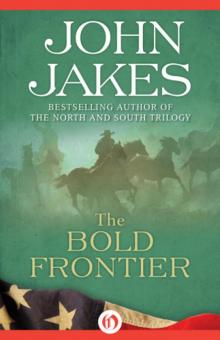 The Bold Frontier
The Bold Frontier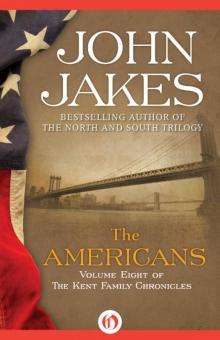 The Americans
The Americans Mention My Name in Atlantis
Mention My Name in Atlantis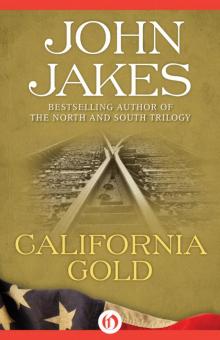 California Gold
California Gold North and South
North and South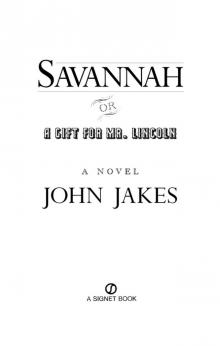 Savannah, or a Gift for Mr. Lincoln
Savannah, or a Gift for Mr. Lincoln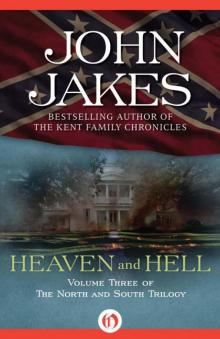 Heaven and Hell
Heaven and Hell Homeland
Homeland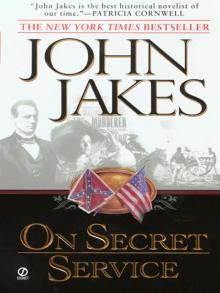 On Secret Service
On Secret Service The Lawless
The Lawless The Titans
The Titans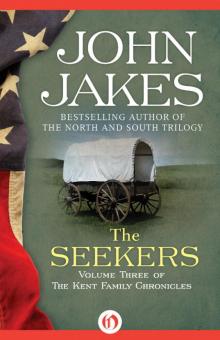 The Seekers
The Seekers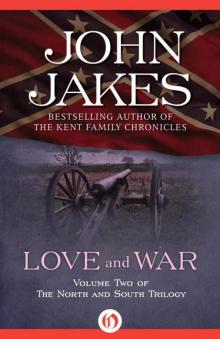 Love and War
Love and War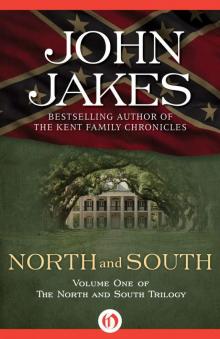 North and South: The North and South Trilogy (Book One)
North and South: The North and South Trilogy (Book One) North and South Trilogy
North and South Trilogy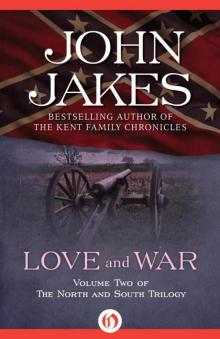 Love and War: The North and South Trilogy
Love and War: The North and South Trilogy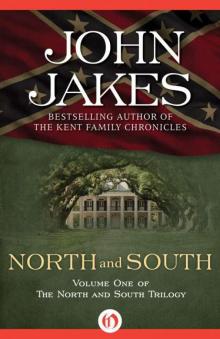 North and South: The North and South Trilogy
North and South: The North and South Trilogy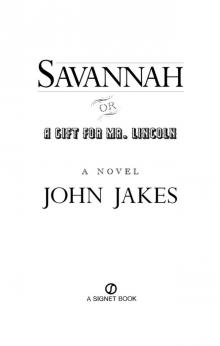 Savannah
Savannah Lawless
Lawless Conquest Of The Planet Of The Apes
Conquest Of The Planet Of The Apes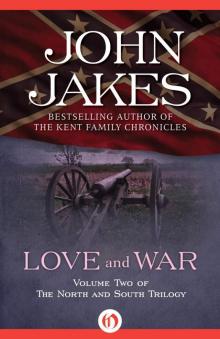 Love and War: The North and South Trilogy (Book Two)
Love and War: The North and South Trilogy (Book Two) The Rebels: The Kent Family Chronicles
The Rebels: The Kent Family Chronicles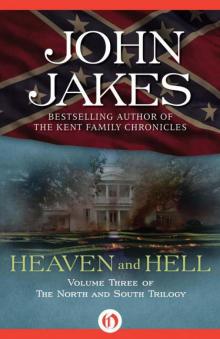 Heaven and Hell: The North and South Trilogy
Heaven and Hell: The North and South Trilogy Planet of the Apes Omnibus 2
Planet of the Apes Omnibus 2 The Bastard: The Kent Family Chronicles
The Bastard: The Kent Family Chronicles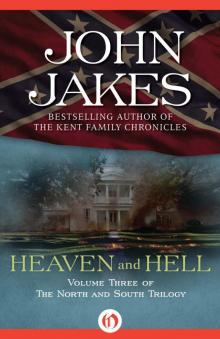 Heaven and Hell: The North and South Trilogy (Book Three)
Heaven and Hell: The North and South Trilogy (Book Three)